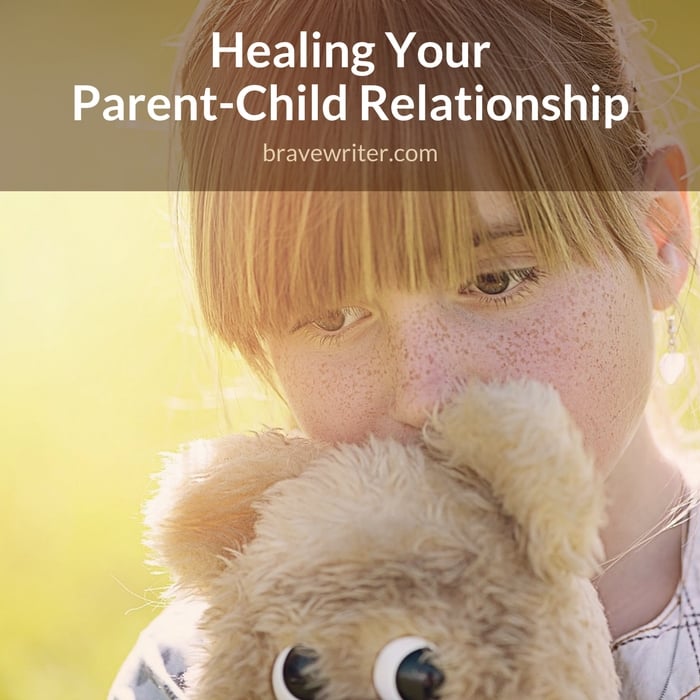Healing Your Parent-Child Relationship

When I first started teaching writing online, I imagined helping parents figure out how to coax delightful words out of somewhat resistant children. I figured that if I could help parents see that the stuff in the heads of their kids was interesting (at least to the kids having the thoughts), writing would follow and that would make Mama happy. A happy Mama would mean a happier home and homeschool… and writing children.
What followed astonished me. Mothers from around the world sent emails to say that the Brave Writer classes had rescued their relationships with their kids. One mom claimed that she had forgotten that she liked her son, so frustrated she’d become with his foot-dragging approach to homeschool. Another mom revealed that she didn’t listen to her children almost ever. She didn’t know that listening was important to writing and had forgotten how important it was to mothering.
By learning to help their children break through,
moms were making discoveries as well.
The conditions we set up for writing seem to foster better relationships between parents and children, almost as a side-benefit! Writing, it turns out, is the “school subject” where souls are exposed, where the chafing in the parent-child relationship becomes most obvious. Somehow by helping children break through their writing blocks, parents discovered how to break through in relating to these stuck kids in a more compassionate, satisfying way.
What surprised me in the teaching of writing, then, is that the communication required to write well led to revived relationships between parents and their children. Kids were asked to express their thoughts forth-rightly, honestly. Parents were expected to “hear” the thoughts, not to judge or modify them. Parents discovered that many times they not only hadn’t been listening, they hadn’t even wanted to listen. Yet they expected their kids to listen to them and to do the things they expected.

There are a few behavioral tactics and principles to draw children out that are a part of the Brave Writer Lifestyle that I want to share here. If you are currently struggling with one of your kids, see if any of these might help. They work for writing and they may just work for your relationship too.
- Touch your child.
In freewriting, I suggest rubbing your child’s shoulders to get him ready to write. This bit of affectionate contact can ease the strain of a “schoolish” demand. Remember throughout your homeschool days to give a hug, run your hands through her hair, hold hands, wrestle, tickle, play a hand-slapping game, snuggle on the couch, or put someone in your lap. - Look your child in the eye.
Showing interest in your child’s thoughts is essential to good writing. Looking him or her in the eye proves you care. You might be surprised how little you stop what you’re doing to look a child in the eye while he or she talks. Be sure to do this once per day with at least one of your children each time. - Invite truth.
If one of your kids is struggling with math, reading, writing, beating a level on a computer game, or learning to do a cartwheel, invite an honest description of the struggle. Don’t help the child get beyond it yet. Rather, ask for the truth and listen to it. Don’t fix or change it. Honor it by acknowledging the disappointment, sense of failure, hopelessness, fear, anxiety or frustration that accompanies the attempt. As in writing, the only way to words for writing is through the true ones right there on the surface stopping the flow of ideas. Solving the problem may follow at a later time, but for now, hearing the truth with empathy is more important. - Get on your child’s level.
In writing, getting on your child’s level means that you will let the child set the pace and agenda for writing, that you’ll sit side-by-side while the child still needs that support as he or she writes. In parenting, it can look like this: getting on the floor, jumping on the trampoline, sitting next to him on the couch holding a controller, laying on her bed at naptime, sharing a stuffed armchair for reading, crawling on all fours with a baby. There is something about reducing the size of your body to your child’s eye-level that helps you see the world from his or her perspective. - Surprise your child.
Skip the hard math lesson, eat dessert first, tell a shocking story, decorate the table, sing to an old pop tune at the top of your lungs, paint the out-of-date patio furniture in six different colors. We parents love routines. Our kids love surprises. See life through your child’s eyes. Surprise catalyzes new language and the desire to communicate which in turn may translate into writing. - Change one thing.
What one thing would make life happier for your child today? Take it seriously and see if there is some way to accommodate it. (Doesn’t like chores and is too tired to do them… you offer to do them today.) Trust is built when you take a child’s needs seriously. Trust is essential to a writer/editor relationship.
Writing is built on trust. A writer wants to know that the person doing the reading of that writing is on her side, is rooting for her success, will take her ideas seriously. Same thing for parenting.


















